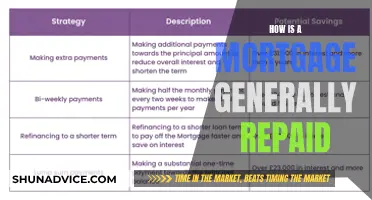
Getting a mortgage preapproval is an important step in the home-buying process. It involves a detailed financial assessment by a lender, who will look at your income, assets, debts, and credit history to determine how much you can borrow. This process can be lengthy, and you will need to provide a lot of documentation. Once you have been preapproved, you will receive a preapproval letter, which is valid for a certain period, after which you will need to renew it. This letter shows sellers that you are a serious buyer and can afford to purchase their home. It also gives you confidence in your home search, as you can look for houses within your budget.
| Characteristics | Values |
|---|---|
| Purpose | To show sellers that you are a serious buyer and can secure a mortgage |
| Requirements | Proof of income, credit history, assets, debts, financial situation |
| Time taken | 10 business days |
| Prequalification | Quick and informal process, does not guarantee approval |
| Preapproval | Detailed financial verification, not a guaranteed loan offer |
| Validity | 60-90 days |
What You'll Learn

The difference between pre-qualification and pre-approval
Pre-qualification and pre-approval are both a way for a lender to help you and a seller estimate what you can afford. However, they differ in the depth of the lender's research. Pre-qualification is an early step in the homebuying journey, providing an estimate of what you might be able to borrow based on an informal evaluation of your finances. It is a quick process that can be done online, and you may get results within an hour. It is also an opportunity to learn about different mortgage options and work with your lender to identify the right fit for your needs and goals.
Pre-approval, on the other hand, is a more official step that requires the lender to verify your financial information and credit history. It is as close as you can get to confirming your creditworthiness without having a purchase contract in place. Lenders will look at your income, assets, debts, and credit record to determine how much money you can borrow, how much you could pay per month, and what your interest rate will be. The application process is likely to take more time, and you should receive your pre-approval letter within 10 business days. This letter is valid for 30 to 90 days and shows sellers that you are a serious buyer.
While pre-approval gives you a competitive edge over other buyers in the market, it does not guarantee that you will get a mortgage. After you find a home to buy, your application will go through full mortgage underwriting, and the lender will review your finances and order a home appraisal to estimate the property's value.
Loandepot Mortgage: Is It the Right Choice for You?
You may want to see also

The role of credit scores
Credit scores play a significant role in the mortgage preapproval process. A preapproval letter from a lender is a statement of their tentative willingness to lend money to the borrower up to a certain amount. It is based on the borrower's creditworthiness, which is determined by their credit score. A higher credit score means the borrower is more likely to secure a loan with a higher amount and a lower interest rate.
Lenders will conduct a hard inquiry on the borrower's credit report, which can cause a slight dip in their credit score. This is because the lender needs to review the borrower's credit history and financial situation to assess their ability to repay the loan. They will look for concerns such as missing or late payments, bankruptcies, or other signs of financial trouble. A good credit score indicates that the borrower is more likely to be approved for a mortgage and will have access to better loan terms.
The impact of a hard inquiry on a credit score is typically minor and temporary, and credit bureaus offer a grace period where multiple inquiries within a short time frame are counted as a single hard inquiry. This allows borrowers to shop around for the best mortgage rates without significantly affecting their credit score. A strong credit score, combined with other factors such as income and assets, can increase the chances of mortgage preapproval and help borrowers secure favourable loan terms.
While a high credit score is advantageous, it is not the sole determining factor for mortgage preapproval. Lenders consider various other factors, including income, assets, and overall financial health. Additionally, there are mortgage programs specifically designed for borrowers with lower credit scores, such as Federal Housing Administration (FHA) loans, which allow for a minimum credit score of 500 with a higher down payment.
In summary, credit scores play a crucial role in the mortgage preapproval process by helping lenders assess the borrower's creditworthiness. A strong credit score can increase the chances of preapproval and lead to more favourable loan terms. However, it is important to note that a perfect credit score is not a requirement, and other factors also come into play in the overall evaluation of a borrower's financial health.
Understanding Mortgage Equity: Calculating Your Home's Value
You may want to see also

The importance of pre-approval for sellers
Pre-approval is an important step in the mortgage process for sellers as it provides them with confidence that a buyer is legitimate and has the financial means to complete the purchase. It also helps to accelerate the loan process, which is beneficial for all parties involved.
When a buyer is pre-approved for a mortgage, they receive a letter from the lender confirming their ability to borrow up to a certain amount. This letter serves as evidence to sellers that the buyer has already initiated contact with a lender and is actively working towards securing financing. It indicates that the buyer is serious about their purchase and isn't simply window shopping.
The pre-approval process involves a comprehensive evaluation of the buyer's finances, including their income, assets, debts, and credit history. Lenders will often request various documents, such as W2 forms, pay stubs, bank statements, and tax returns, to verify the buyer's financial stability. This rigorous process provides sellers with assurance that the buyer is creditworthy and capable of obtaining the necessary financing to complete the transaction.
Additionally, pre-approval can give buyers a competitive edge in a busy market. It demonstrates to sellers that their offer is valid and less likely to fall through due to financing issues. This can be particularly advantageous when competing against other buyers who may not have the same level of financial assurance.
Moreover, pre-approval helps to streamline the closing process. Since much of the buyer's financial information is already in the lender's system, it expedites the final stages of the loan process once an offer is accepted. This efficiency benefits both the seller and the buyer, reducing the time and uncertainty associated with the transaction.
In summary, pre-approval is crucial for sellers as it establishes the buyer's credibility, demonstrates their commitment to the purchase, and increases the likelihood of a successful and timely transaction. By seeking pre-approval, buyers can assure sellers of their financial capacity and seriousness, making them more attractive candidates in the home-buying process.
The Underwriting Process: A Mortgage Deal-Maker or Breaker
You may want to see also

How to get pre-approved
Getting pre-approved for a mortgage is an important step in the home-buying process. It shows sellers that you are a serious buyer with your finances in check and that you are likely to qualify for a loan. Here is a step-by-step guide on how to get pre-approved:
- Understand the difference between pre-qualification and pre-approval: Pre-qualification is an early step in the home-buying journey, where a lender provides an estimate of how much you may qualify to borrow based on basic financial information. It is a quick and informal process that does not require a hard credit check. On the other hand, pre-approval involves a detailed financial verification, including income documentation, credit checks, and a thorough financial assessment.
- Choose a lender: Different lenders have different requirements and processes for pre-approval. Some may offer only pre-qualification, while others may offer pre-approval. Research and compare multiple lenders to find one that suits your needs.
- Gather the required documents: Lenders will typically ask for documentation related to your income, assets, debts, and credit history. This may include pay stubs, tax returns, bank statements, and credit reports. Having all your documents ready will streamline the pre-approval process.
- Complete the mortgage application: Provide the lender with detailed information about your finances, including your income, debts, assets, and credit score. Be prepared to answer any questions the lender may have about your financial situation.
- Wait for the lender's decision: The lender will review your application and verify the information you provided. They will assess your financial situation and determine if you meet their requirements for pre-approval. This process can take a few days to several months, depending on the complexity of your finances.
- Receive the pre-approval letter: If your application is approved, you will receive a pre-approval letter from the lender. This letter states that the lender is tentatively willing to lend you a specific amount for your home purchase. It is important to note that pre-approval is not a guarantee of a loan offer.
- Review the pre-approval terms: Understand the expiration date of your pre-approval letter, which is typically valid for 60 to 90 days. Ask the lender about any assumptions or conditions associated with the pre-approval. Ensure you have all the necessary documentation to avoid surprises later in the process.
- Start shopping for homes: With your pre-approval in hand, you can now begin your home search within your budget. Real estate agents may require you to present your pre-approval letter before showing you houses. Your pre-approval amount will guide you in making offers on potential homes.
Mortgage Deduction: A Crucial Financial Strategy for Homeowners
You may want to see also

The benefits of pre-approval for home buyers
Mortgage pre-approval is an important step in the home-buying process, offering many benefits that improve your position as a buyer. Here are some advantages of mortgage pre-approval for home buyers:
Confidence in your search
Mortgage pre-approval gives you confidence by letting you know how much you can afford to borrow for your mortgage. This helps you focus on properties within your budget, saving you time during your house hunt and preventing the potential heartbreak of falling in love with a house you can't afford.
Establishes credibility and strengthens your offer
A pre-approval letter shows sellers that you are a serious buyer with your finances in order, increasing the likelihood that you will be able to complete the purchase. This establishes your credibility and can make your offer more competitive, especially in a market with multiple offers on a property.
Streamlines the loan process
With most of your information already in the lender's system, mortgage pre-approval can accelerate the loan process once you make an offer. It also allows you to lock in a mortgage rate for a certain period, typically 30 to 120 days. If rates rise by the time you're ready to purchase, you benefit from the rate guaranteed by your pre-approval.
Flexibility on terms and pricing
Mortgage pre-approval can offer you more flexibility in negotiating terms and pricing compared to buyers who have not been pre-approved. Even when competing with all-cash offers, a pre-approval demonstrates that your finances are in order and you are a legitimate buyer.
Identify potential issues
The pre-approval process can help you identify and correct potential issues early on. Lenders will examine your financial details, so it is important to be prepared to answer any questions that may arise during this process.
In summary, mortgage pre-approval is a valuable step that can strengthen your position as a buyer, improve your chances of having your offer accepted, and streamline the loan process once you find your dream home.
Understanding APR Application to Your Mortgage
You may want to see also
Frequently asked questions
A mortgage preapproval is written verification from a mortgage lender, which states that you qualify to borrow a specific amount of money for a home purchase. It is based on a review of your credit history, credit scores, income, debt and assets.
Prequalification is an early step in your homebuying journey. It is an informal process that does not require a hard credit check and gives buyers a general idea of their loan affordability. On the other hand, preapproval involves a detailed financial verification and is a more thorough look at your finances.
Mortgage preapproval helps buyers search for homes within their budget, making for a smoother and more efficient house hunt. It also makes an offer more enticing to a seller, and gets a bulk of the mortgage process done early on.







